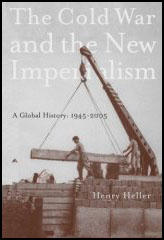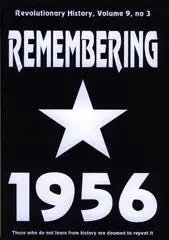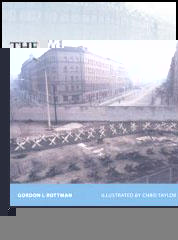Spartacus Review
Volume 12: 10th February, 2008
The Cold War

Title: The Cold War and the New Imperialism
Author: Henry Heller
Editor:
Publisher: Monthly Review Press
Price: £17.95
Bookshop: Amazon
Spartacus Website: Cold War Index
Category:
"The Cold War and the New Imperialism" is an account of global history since 1945, which brings massive changes in global politics, economics, and society together in a single narrative, illuminating and clarifying the dilemmas of the present. Written for the general reader, it draws together scholarly research from a wide range of sources without losing sight of the larger pattern of events. In the sixty-year period since the end of World War II, the world has indeed been remade. The war itself mobilized the political and social aspirations of hundreds of millions of people. The contest between the United States and the Soviet Union for global dominance drew every country into its field of force. Struggles for national liberation in the Third World brought an end to colonial empires. Revolutions in China, Cuba, Vietnam and elsewhere shook the global order, as did failed uprisings in Paris and Prague. Since the end of the Cold War the forces of the capitalist market have overwhelmed social institutions that have given meaning to human existence for centuries. But the end of the Cold War has created as many problems for the world's remaining superpower, the United States, as it has solved. With its political, economic, and financial hegemony eroding, the United States has responded with military adventures abroad and increasing inequality and authoritarianism at home. "The Cold War and the New Imperialism" draws all these threads together and shows vividly that the end of history is not in sight.

Title: Remembering 1956
Author: Al Richardson
Editor:
Publisher: Porcupine Press
Price: £9.50
Bookshop: Amazon
Spartacus Website: Hungarian Uprising
Category:
Nikita Khrushchev's "Secret Speech" at the Twentieth Congress of the Communist Party of the Soviet Union in February 1956 sent shock-waves throughout the Soviet bloc and the official Communist movement. In their offices in London, Paris and Rome, Communist party leaders struggled to rescue what they could of their tattered public image, whilst their counterparts in Poland and Hungary were faced with mass working-class unrest in the streets of Poznan and Budapest. This book investigates reactions to the events of 1956.

Title: The Berlin Wall 1961-89
Author: Gordon Rottman
Editor:
Publisher: Osprey
Price: £11.99
Bookshop: Amazon
Spartacus Website: Berlin Wall
Category:
The border between East and West Germany was closed on 26 May 1953. On 13 August 1961 crude fences and walls were erected around West Berlin: the Berlin Wall had been created. The Wall encircled West Berlin for a distance of 155km, and its barriers and surveillance systems evolved over the years into an advanced obstacle network. The Intra-German Border ran from the Baltic Sea to the Czechoslovak border for 1,381km, and was where NATO forces faced the Warsaw Pact for the 45 years of the Cold War. This book examines the international situation that led to the establishment of the Berlin Wall and the IGB, and discusses how these barrier systems were operated, and finally fell.
